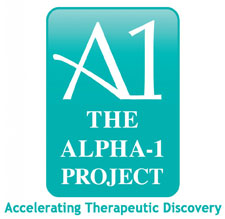 Researchers at UMass Medical School have been commissioned by the Alpha-1 Project (TAP) to develop a PiZ antibody. The antibody will be used to track the presence of mutant alpha-1 PiZ protein in human blood serum, an essential tool in testing potential therapies for alpha-1 antitrypsin deficiency (alpha-1).
Researchers at UMass Medical School have been commissioned by the Alpha-1 Project (TAP) to develop a PiZ antibody. The antibody will be used to track the presence of mutant alpha-1 PiZ protein in human blood serum, an essential tool in testing potential therapies for alpha-1 antitrypsin deficiency (alpha-1).
Alpha-1 is a genetic condition characterized by low or absent levels of alpha-1 protein in the blood. Normal alpha-1 protein protects the lungs against damage caused by neutrophil elastase. In alpha-1, the mutant PiZ protein is misfolded and cannot be transported into the blood. This can lead to emphysema due to the loss of the alpha-1 protein’s protective effects in the lung, and liver disease caused by the abnormal buildup of alpha-1 protein in the liver cells.
UMMS scientists plan to optimize the antibody to track the PiZ protein in human macrophages (white blood cells) and liver tissue. The antibody could be used, along with a currently available antibody that tracks normal (PiM) protein, to test a dual-function viral strategy to both reduce the body’s production of abnormal PiZ protein and increase production of the normal PiM protein. The contract also calls for the PiZ antibody to be made available to other researchers and businesses that request it.
“The production and dissemination of the PiZ antibody is another example of our commitment to provide tools to researchers in finding a cure for alpha-1,” said Jean-Marc Quach, executive director of TAP.
“Tremendous progress has been made over the last several years in the search for a breakthrough treatment for alpha-1,” said Terence R. Flotte, MD, the Celia and Isaac Haidak Professor of Medical Education, executive deputy chancellor, provost, dean of the School of Medicine and professor of pediatrics and microbiology & physiological systems. “While tools have been available to assess total amounts of alpha-1 and PiM protein, there has not been a specific assay to pick up only the mutant PiZ protein in human serum and liver tissue samples. As more therapeutic options aimed at down regulating or degrading PiZ become available, it is essential we have a way to easily and efficiently track its release and evaluate new potential treatments.”
“This is an exciting step forward in seeking new therapies for alpha-1,” said John Walsh, president and CEO of the Alpha-1 Foundation and member of TAP’s board of directors. “UMMS researchers are doing cutting-edge research on both reducing the amount of defective PiZ protein and increasing the amount of healthy PiM protein in the body. The PiZ antibody will speed their progress.”
Christian Mueller, PhD, assistant professor of pediatrics in the Gene Therapy Center, said, “Recently we characterized an antibody clone that was able to differentiate between human PiZ and PiM protein in mice sera. By further characterizing this antibody specifically for human serum we can more readily detect the presence of the disease-causing PiZ protein circulating in the blood using standard diagnostic tools.”